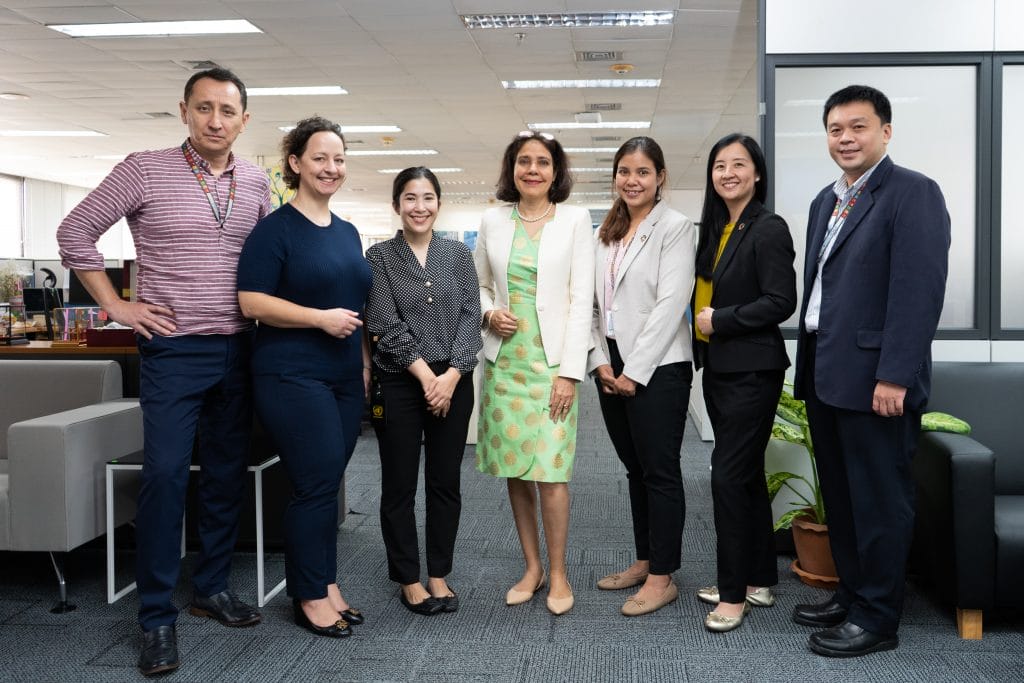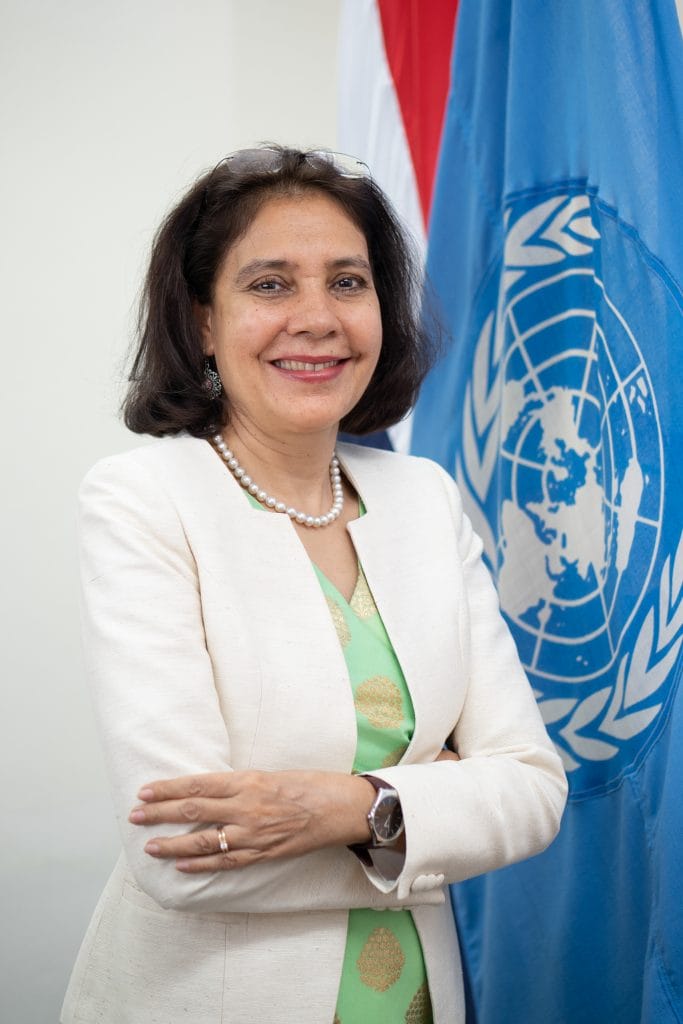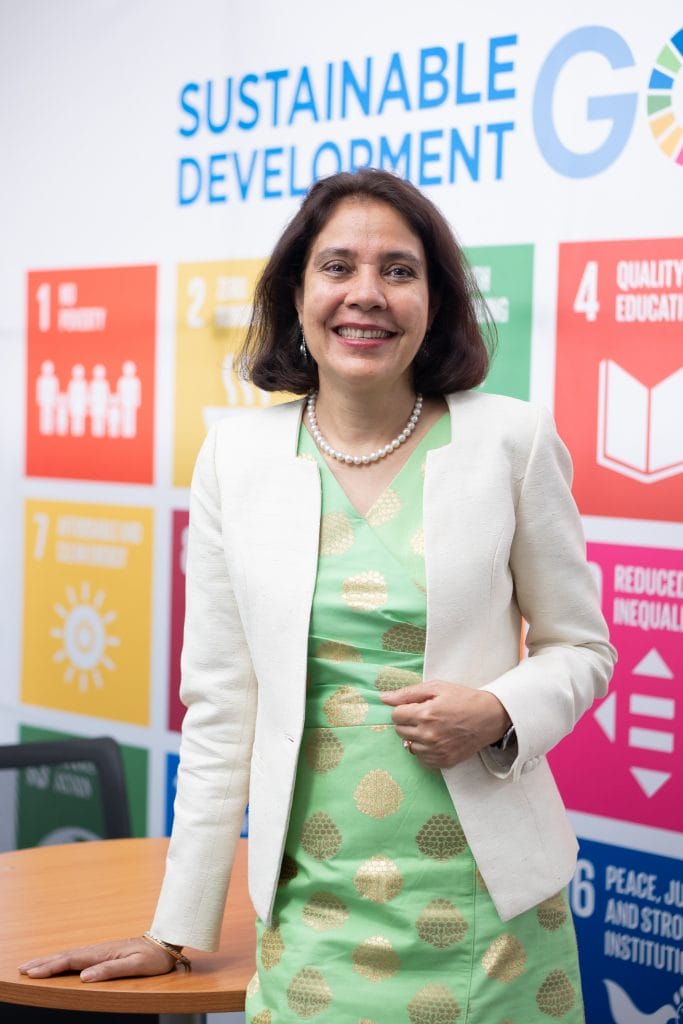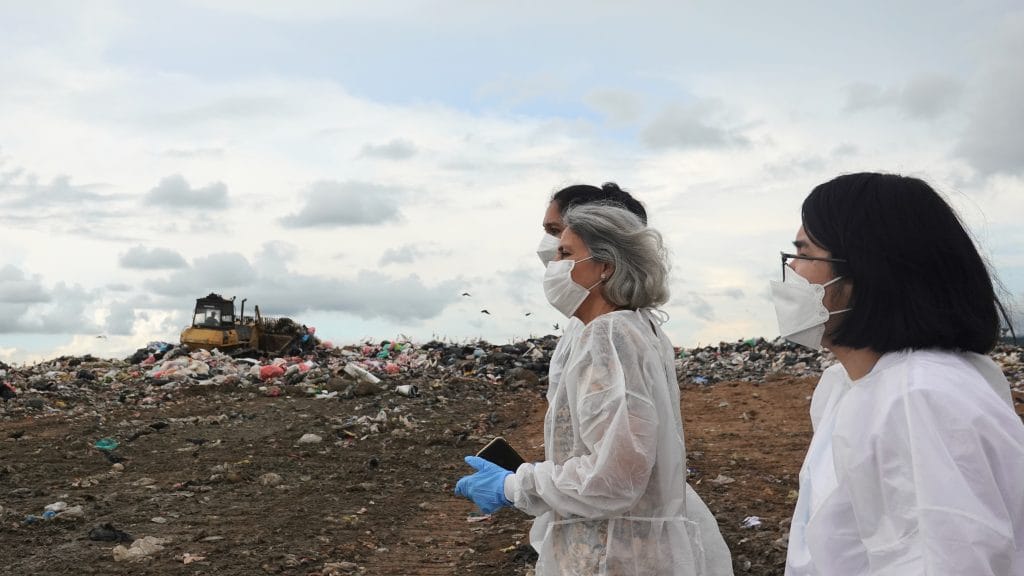Demystifying the UN’s key role in achieving transformative change in the country.
By Aiden Jewelle Gonzales
As I enter the United Nations compound in Bangkok, unmistakeable with its sweeping panorama of flags that proudly proclaim that herein lies the world’s largest and most renowned international organisation, it brought me back to the last time I stepped foot on its premises. A young teen, I was attending an awareness-raising campaign on violence against women hosted by what was then UNIFEM (now UN Women), who hoped that we would champion the global campaign among our peers – which we did. A formative memory, being even a small part of this youth-led social wave shaped a lot of my respect for the development work of multi- lateral organisations like the UN, and what they hope to accomplish.
Nevertheless, the UN remains for many a respectable but distant concept; important work done by the chosen few, with most of the public none the wiser about what the UN accomplishes on the ground in countries like Thailand. I met with Gita Sabharwal, the UN Resident Coordinator, to help lift the veil on – even I was surprised to discover – the 21 UN agencies, funds, and programmes in Thailand, and the ways they achieve their collective promise to “leave no one behind” – a prominent principle from the United Nations Sustainable Development Cooperation Framework.
“We want to make the UN more accessible and approachable to people,” Gita tells me as she and her team in the Resident Coordinator’s Office warmly receive us. I urge her to start by telling me a little bit about her background, as the representative of the UN Secretary-General in the country. “I grew up in Delhi in a regular middle-class family, which back in those days was considered very privileged in India,” she recalls. “As my dad worked for the Indian Railways, we lived in other cities as well while I was growing up: Calcutta, Hyderabad, Guwahati, and Ahmedabad. This allowed me to soak in cultural diversity in its fullest, and learn to cope with change.”
After having obtained a bachelor’s degree from Delhi University and then a Master’s in Development Management in the UK, Gita went on to gain almost three decades of development experience in several countries in Asia, including India, the Maldives, Sri Lanka, and Vietnam. “I’ve worked in management and strategic leadership roles with different institutions, ranging from a grassroots women’s collective, to an international foundation, to bilateral and multilateral organisations,” she tells me, to my admiration. “My work at the United Nations has primarily focused on accelerating the Sustainable Development Goals (SDGs) to secure peace, advance human rights, and scale up development gains through strategic partnerships with governments, the private sector, and civil society.”
I delve deeper into her role as Resident Coordinator, and she explains: “I lead the UN Country Team, a role that essentially enables a consolidated, coordinated, and comprehensive approach by the UN to support transformative change and accelerate the advancement of the SDGs in partnership with the government, private sector, and civil society.” Clearly impassioned about the work they do, she shares the key role that the UN plays in these positive transformations, through “bringing cutting-edge science and forward-looking know-how to bear, on polices to reduce inequalities, mitigate climate change, and empower women, to name just a few pressing challenges.”
In an exclusive sit-down with Masala, she walks me through her journey to where she is now, and the full spectrum of work the UN Country Team does to advance the SDGs.
You mentioned that your peripatetic childhood in India allowed you to immerse yourself in cultural diversity. How else did your experiences shape who you are and what you do today?
During my student days in India, I frequently volunteered, spending a lot of time on trying to better understand why people were poor. Was it caste, karma, or structural factors that prevented equal access to basic services, forcing some to live on the margins of society?
I saw that the gender divide made the experience of poverty even starker for women and young girls. Even relatively-privileged women like me experienced this divide to some extent. I felt I needed to do something, and started by joining an NGO that sought to empower rural women in one of the poorest provinces of Gujarat. It was definitely not what my parents wanted me to do!
I mobilised rural women from across 200 villages to set up a savings and credit programme which they led, and which began with each woman contributing a monthly saving of just 20 cents. This enabled women to offer microloans at a reasonable rate of interest to the programme’s members, thereby bypassing exploitative moneylenders.
What led you to transition into the international development field, and eventually the UN?
Those four years of working with rural women in remote Indian villages remain a reference point in my life. The experience has informed my belief system and taught me to appreciate the resilience of rural women and their ability to continue striving despite challenges. It also led me to understand the multi-dimensional nature of poverty and where solutions to it lay.
My journey has since taken me many places, and now I am in Thailand, eight years after I joined the UN. I feel privileged to serve as the UN Resident Coordinator here by bringing the UN system together to support the advancement of the SDGs in Thailand.
The SDGs are core to the work of the UN. How do you see them in the Thai context?
The 17 SDGs target a holistic transformation of societies predicated on principles of sustainability, human rights, equity, and inclusion. Thailand has made good progress on several of the SDGs, particularly in poverty eradication, healthcare provision, industrial and infrastructure development, and quality education.
However, more progress needs to be made on other SDGs. These include further reducing inequalities, cutting greenhouse gas emissions, and protecting ecosystems both on land and underwater. The next eight years will be critical to resuming gains towards all the SDGs, not just in Thailand, but across the entire Asia-Pacific region. As matters stand, the UN’s Economic and Social Commission for Asia and the Pacific (ESCAP) estimates that the region will reach the SDGs only by 2065.
Let me take this opportunity to urge readers of Masala to engage on the sustainable development agenda by taking the SDGs Primer. It can be taken at: https://sdgprimer.un.org
What do UN priorities look like in Thailand?
We have just signed a five-year Cooperation Framework that sets out what the UN will do to progress the SDGs in alignment with Thailand’s transformative national sustainability agendas, primarily the Bio-Circular-Green model.
The framework is delivering on three broad priorities. The first priority supports Thailand’s transformation into an inclusive, green, resilient nation with a low-carbon economy. The second targets human capital development through strengthening institutions, building partnerships, and empowering people with a focus on digital transformation. The third addresses inequalities by expanding social protection, strengthening the rule of law, eliminating all forms of discrimination, and fostering social cohesion.
Importantly, this strategic vision unites the UN system in Thailand to deliver on these commitments. We benefit from our ability to convene wide-ranging stakeholders and to maximise impacts through the UN’s cutting-edge offerings and science-based solutions to accelerate the SDGs.
What are the most significant opportunities and challenges that you’ve found in this role?
I think my greatest opportunity lies in rallying the UN system and many other stakeholders to implement sustainable development solutions. For Thailand, as for all countries, a major challenge lies in accelerating progress on the climate through concerted actions by the government, private sector, youth, and local communities.
According to ESCAP estimates based on pre-pandemic data, achieving climate-related SDGs in Thailand will cost only THB 13 per person per day, for a decade, in additional investments. That is hardly an insurmountable burden, and the country can help unlock these additional investments.
Another key challenge relates to formalising carbon markets, which remain voluntary in Thailand. In a post-COP26 world, we need to examine carbon taxation, pricing, and credit reporting to accelerate progress on greenhouse gas (GHG) reductions to drive economic growth.
What role can young people in the Thai-Indian community and beyond play in these processes?
One of our main goals is to expand opportunities for youth and women to acquire skills and engage more meaningfully in climate action. In Thailand, young people are eager to be part of the global movement for sustainable growth, and we need to maximise spaces for them to join policy processes and drive innovations.
I have set up the SDGs Youth Panel, which serves as an advisory board to me as the Resident Coordinator. It is comprised of young leaders making a difference in their communities, and they are truly inspirational. We are hearing their voices, and their views are being factored into our work in country.
The SDG Youth Panel members met with the UN Deputy Secretary- General, the President of the General Assembly, and the Vice President of the Economic and Social Council (ECOSOC) earlier this year. Their advice to the UN has helped us become more accessible through our advocacy campaigns and improved the way we communicate with the public.
What is the UN doing in support of climate action in Thailand?
The UN has a multipronged approach to climate action in Thailand. Institutionally, we leverage the Cooperation Framework to foreground climate action into our dialogue with the government and private sector. Through this process, we have defined where the UN could add value through science-based solutions. One example is ESCAP’s chemical fingerprinting analysis of smoke in Bangkok to pinpoint its causes, composition, degrees of toxicity and health impacts.
Partnerships with the Global Compact Network and capital markets is another element of our strategy to raise ambition. The private sector has set a target for carbon neutrality by 2050 while investors and bankers have committed to sustainable financing via the principles of responsible banking and investment. We’re also bringing in cleaner technologies in heavily-polluting industries, supporting resource-efficient industrial production, and piloting waste management assessments for bio-circular solutions in municipalities. All these will be key to reducing carbon emissions.
In addition, we are piloting community initiatives, such as planting forests to boost biodiversity, act as carbon sinks, and reduce PM2.5 pollution while protecting species and their habitats. We’ve also recently hosted 76 Governors of Thailand who signed the Statement of Commitment for a Sustainable Thailand. This will enable the UN to scale up climate actions in the provinces.
In light of your efforts towards promoting climate action in Thailand, what measures are you taking to make the UN compound carbon neutral?
The UN premises at ESCAP have been climate neutral since 2017. We have reduced our energy consumption by 40 percent and water usage by 60 percent in four years, and offset any residual emissions. Since 2020, all our electricity comes from renewables, both from Thai solar plants and from the 900 solar panels installed at the UN compound.
Waste generated in the compound is sorted at the source, and provided to local recyclers and NGOs for recycling. Thanks to thorough waste management and awareness campaigns, we are able to recycle 80 percent of our waste. All organic waste is sent to composting through a local NGO that resells it as compost. We also engage green catering operations and require them to exclude any single-use materials. A ban on single use plastics in our catering since 2018 has helped us to prevent nine tons of waste every year. We also carefully selected local plants in the compound’s landscaping for their air-filtering properties.
Why is the UN so important for championing sustainable development?
In today’s volatile global context with energy and food shortages and economic slowdowns, it will be vital to leverage multinational cooperation to further the global development agenda. The Human Development Report shows that more than one hundred million people have been pushed into poverty over the past two years.
For the first time in more than three decades, the global Human Development Index, which measures nations’ standards of living, has declined for two successive years, taking it back to 2016 levels globally. Thailand has managed to sustain its developmental gains despite the pandemic, but in the Asia-Pacific region overall, less than 10 percent of the SDGs are on course to being achieved by 2030.
We are also faced with the triple planetary crises: climate change, biodiversity loss, and pollution. All these crises necessitate closer international collaboration to reinvigorate multilateralism, with the United Nations at the centre. When multilateralism is strong, the international system works in tandem to find solutions, acts fast for everyone during times of emergency, and shares accountability.
In ‘Our Common Agenda’, the Secretary-General had outlined his vision for improved multilateralism focused on protecting our global commons and delivering critical global public goods.

Thailand is famous for its tourism industry. How can the sector be made more environmentally sustainable?
Tourism is a major contributor to GDP and has brought great economic benefits, but some unsustainable practices have damaged ecosystems both on land and underwater. Done responsibly, tourism can go hand in hand with the preservation of natural resources and biodiversity.
The UN agencies in Thailand are piloting initiatives to engage and empower local people to not only benefit from tourism but play a crucial role in biodiversity conservation efforts.
For instance, UNDP is promoting biodiversity-based tourism in the Huai Kha Khaeng Wildlife Sanctuary, which is home to critically endangered species such as tigers. This form of ecotourism can become an important source of livelihood for local communities, resulting in them valuing and protecting wildlife even more. Similarly, UNESCO, together with Expedia, secured commitments from 500 hotels in Thailand to eliminate single-use plastic products and promote local culture and natural products through the Sustainable Travel Pledge. Crowd sourcing for conservation has also provided the additional resources that are needed to protect ecosystems.
On a more personal note, what do you find most fulfilling about your career so far?
I especially cherish the strategic vision I can leverage to lift the UN system in Thailand to collectively deliver on our commitments. Similarly, I value the ability to convene wide-ranging stakeholders, maximise the UN’s impact through science-based solutions, and position the UN to be a cutting-edge institution, offering integrated policy support with a focus on leaving no one behind.
Finally, do you have any advice for those hoping to work in this field?
Follow your passion for development, peace, planet, and human rights and life will unfold opportunities to get you to the right place to make a difference!









